Mangalore: Hydrogen Innovation Pvt. Ltd. hosted Innovation Day 2025, a flagship event focused on the future of green hydrogen in India. The event brought together leaders from government, academia, and industry for a day of collaboration, knowledge-sharing, and innovation.
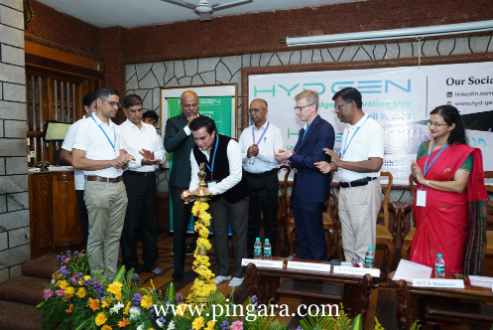
HYDGEN open the doors of the state-of-the-art facility at Sahyadri Campus in Mangaluru to industry leaders, policymakers, and experts. HYDGEN Innovation Day 2025 is more than a technology showcase—it is a call for industry-wide action. A chance for policymakers, business leaders, and innovators to come together and explore real-world solutions that makes industries stronger, more self-reliant, and ready for the future.

HYDGEN Inaugural Session was inaugurated by T. D. Raje gowda, MLA of Sringeri and Chairman of Karnataka Renewable Energy Development Limited (KREDL), Dr Ranjith Krishna Pai, Sr Director & Scientist 'F' at the Climate, Energy and sustainable Technology Division of the DST, Government of India, Dr. Michael Gryseels, Chairman at HYDGEN, Dr. Goutam Dalapati, Chief Technology Officer at HYDGEN, Dr Manippady Krishna Kumar, Chief Operating Officer at HYDGEN, Dr. SS Injaganeri, Principalat Sahyadri College, Dr Manjappa Sarathi, Director of research, Sahyadri College. And Ramyasri DS Corporate Director at HYDGEN, Chandrashekhar Aithal Facility manager at HYDGEN, where present in Hydrogen Innovation Day programme.
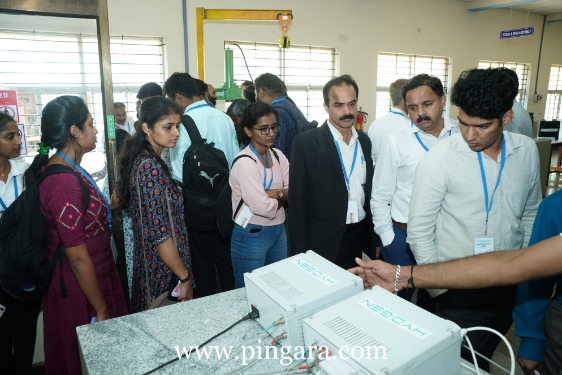
Inaugural Addressby T. D. Rajegowda, MLA of Sringeri and Chairman of Karnataka Renewable Energy Development Limited (KREDL)
Karnataka is taking bold steps to empower the green hydrogen sector, with several government-led initiatives driving innovation and adoption. T. D. Rajegowda, MLA of Sringeri and Chairman of Karnataka Renewable Energy Development Limited (KREDL), has been instrumental in shaping policies that support green hydrogen production, infrastructure, and investment. The state is developing a dedicated Green Hydrogen Policy to accelerate adoption and attract global investors. Additionally, Karnataka is exploring a Green Energy Corridor to enhance hydrogen transmission and integration with renewable sources. KREDL is actively supporting pilot projects, including a 300kW Green Hydrogen initiative at BTPS. These efforts position Karnataka as a leader in India's clean energy transition, fostering sustainability and industrial decarbonization.
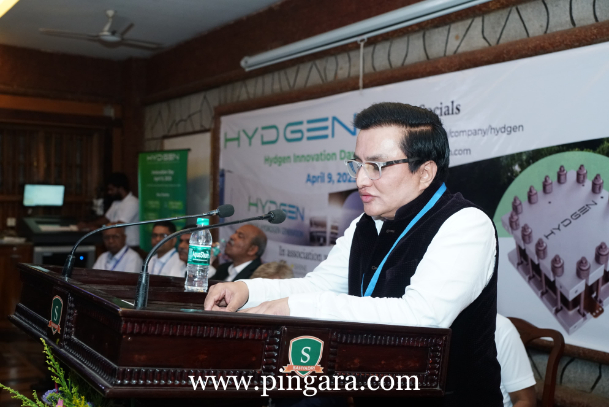
Key Note Address by Dr Ranjith Krishna Pai, Sr Director & Scientist 'F' at the Climate, Energy and sustainable Technology Division of the DST, Government of India
India is actively fostering green hydrogen transition through strategic initiatives led by the Department of Science & Technology (DST). Dr.Ranjith Krishna Pai, Senior Director & Scientist 'F' at DST, has been instrumental in advancing Hydrogen Valley projects, which integrate production, storage, distribution, and utilization into a single ecosystem. These initiatives aim to create self-sustaining hydrogen hubs, accelerating industrial adoption and clean energy deployment. DST’s focus on cutting-edge hydrogen technologies, including quantum-backed hydrogen production, is driving innovation and cost reduction. As India scales up its green hydrogen infrastructure, these efforts will play a pivotal role in achieving net-zero emissions and energy security.
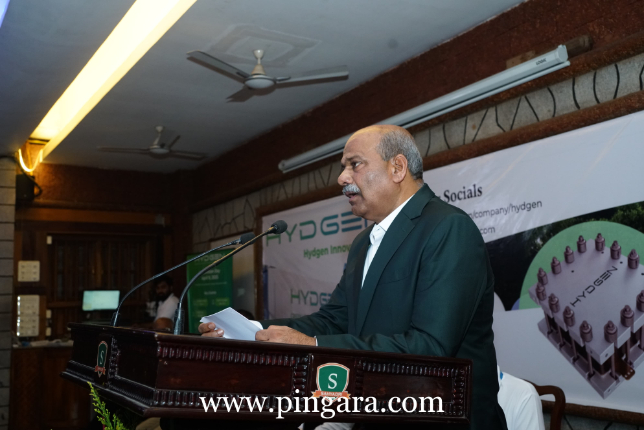
Deepak Yadav - Overview of the GH2 value chain & the future energy landscape:
Led a talk on Overview of the GH2 value chain & the future energy landscape organized by the Hydrogen Innovation Pvt Ltd. His talk covered key aspects of the GH2 value chain also explored whether green hydrogen is a hype or a tangible reality, prompting participants to reflect on its complexities and future potential including:
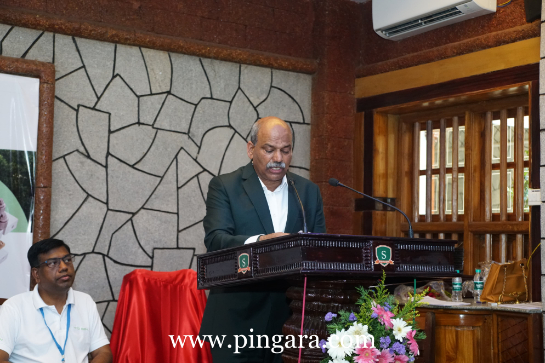
- Production Pathways: Green hydrogen and its derivatives like green ammonia and methanol.
- Economic Viability: Cost development of electrolysers, GH2, and PtX derivatives.
- Infrastructure & Trade: Transportation, storage, and sector-specific demand markets.
- Sustainability & Policy: Environmental, economic, social, and governance (EESG) frameworks.
- India’s National Green Hydrogen Mission: Positioning India as a global hub for GH2 production, usage, and export.
Panel Discussion - Fuelling the Future: Investment Strategies for Green Hydrogen in India
Fuelling the Future: Investment Strategies for Green Hydrogen in India," brought together a distinguished panel of experts— Mohammed Shoeb Ali (Managing Director at TVC), Dr Avishek Kumar (VFlowTech), and Priyaanka S (YonderH2 Adore) —who shared valuable insights into the evolving green hydrogen landscape. Moderated by MichealGryseels (Chairman of Hydrigen Innovation Pte. Ltd., the discussion explored critical topics, including industrial applications, cost feasibility, and global market trends shaping the future of green hydrogen. The panelists provided key perspectives on how India’s green hydrogen strategy is developing, highlighting investment opportunities, policy frameworks, and sustainability goals that will drive its adoption in various sectors.
Sunil Sachdev, Indian Oil Corpotation Ltd - Green Hydrogen and its applications in refineries.
Green hydrogen is set to revolutionize the refining industry by offering a clean and sustainable alternative to conventional hydrogen production. Sunil Sachdev, Senior Manager at Indian Oil Corporation Ltd., highlighted its critical role in reducing carbon emissions and enhancing energy efficiency in refineries. Traditionally, refineries rely on grey hydrogen, which is derived from fossil fuels and contributes to greenhouse gas emissions. By transitioning to green hydrogen, produced through electrolysis using renewable energy, refineries can significantly decarbonize operations, improve sustainability, and align with global climate goals. This shift not only supports India's National Green Hydrogen Mission but also strengthens the country's position in the global clean energy transition.
Dr. Nagesh Kini, Co-founder & CTO of Vimano EWA Pvt.Ltd - Membranes and thier applications
Membrane technology is at the heart of clean energy innovation, playing a crucial role in electrochemical systems such as fuel cells, electrolyzers, and redox flow batteries. Dr.NageshKini, Co-founder & CTO of Vimano EWA Pvt. Ltd, emphasized how advanced ion-conductive membranes are transforming green hydrogen production by enhancing efficiency and reducing costs. These membranes improve energy conversion, durability, and scalability, making them essential for long-duration energy storage and industrial decarbonization. As India accelerates its green hydrogen adoption, membrane technology will be a key enabler in achieving sustainable energy goals and reducing reliance on fossil fuels.
Snehal Suryavanshi, Head of cleantech & sustainability - Ultra pure water generation through green hydrogen electrolysis
Ultra-pure water (UPW) is a critical component in green hydrogen electrolysis, ensuring optimal efficiency and longevity of electrolyzers. Snehal Suryavanshi, Head of Cleantech & Sustainability, emphasized the importance of high-purity water in hydrogen production, as impurities can degrade electrolyzer performance and increase operational costs. Advanced water purification technologies, such as reverse osmosis and electrodeionization, help achieve the required purity levels, enabling stable hydrogen generation while minimizing environmental impact. As India scales up its green hydrogen infrastructure, ensuring consistent UPW quality will be essential for cost-effective and sustainable hydrogen production.
Jayant Mali - GH2 initiatives by Batliboi
Batliboi Ltd is actively advancing green hydrogen (GH2) initiatives, focusing on sustainable energy solutions and industrial applications. Jayant Mali highlighted the company's commitment to integrating GH2 technologies into manufacturing processes, aiming to reduce carbon footprints and enhance energy efficiency. Batliboi is exploring hydrogen-powered machinery, optimizing electrolyser systems, and investing in renewable-driven hydrogen production to support India's clean energy transition. These initiatives align with the broader goal of decarbonizing industries, fostering innovation, and positioning India as a leader in green hydrogen adoption.
Kamya Kalra, Policy Associate at GH2 India - Green Hydrogen Policies In India
India’s Green Hydrogen policies are shaping the country’s transition toward a clean energy future, with ambitious initiatives under the National Green Hydrogen Mission. Kamya Kalra, Policy Associate at GH2 India, highlighted key policy frameworks that support GH2 production, infrastructure development, and market expansion. The government is facilitating competitive bidding, demand creation, and financial incentives to accelerate adoption. Additionally, strategic interventions such as electrolyser manufacturing incentives and pilot projects in steel, mobility, and shipping are driving innovation. These policies aim to position India as a global hub for green hydrogen, reducing fossil fuel dependency and fostering sustainable industrial growth.
Dr Prashanth Suryawanshi, Senior project Leader at Tridiagonal Solutions Pvt Ltd - Membrane Electrode Assembly
Membrane Electrode Assembly (MEA) is a critical component in fuel cells and electrolyzers, enabling efficient electrochemical reactions for hydrogen production and energy conversion. Dr.PrashanthSuryawanshi, Senior Project Leader at Tridiagonal Solutions Pvt Ltd, emphasized how advancements in MEA technology are driving improvements in performance, durability, and cost-effectiveness. By optimizing catalyst layers, gas diffusion media, and polymer electrolyte membranes, MEAs enhance hydrogen fuel cell efficiency, making them a key enabler in clean energy applications. As India accelerates its green hydrogen adoption, innovations in MEA design will play a pivotal role in scaling up hydrogen infrastructure and achieving sustainable energy goals.
Shyam Prasad, Founder of Speciality Graphites Gaskets for Electrolyser Technology
Gaskets play a critical role in electrolyser technology, ensuring efficient sealing, durability, and operational stability in hydrogen production systems. Shyam Prasad, Founder of Speciality Graphites, highlighted how high-performance gasket materials enhance electrolyser efficiency by preventing leaks, maintaining system pressure, and preserving hydrogen purity. Advanced graphite-based gaskets offer superior chemical resistance, thermal stability, and electrical insulation, making them ideal for alkaline and proton exchange membrane (PEM) electrolysers. As India scales up its green hydrogen infrastructure, innovations in gasket technology will be essential for optimizing electrolyser performance and ensuring cost-effective hydrogen production.
Dr VaibhavAncham, Founder & MD ChemEngg Research Catalysts and Membranes for Electrolyzers.
Catalysts and membranes are key enablers in electrolyzer technology, driving efficient hydrogen production and improving system performance. Dr. Vaibhav Ancham, Founder & MD of Chem Engg Research, emphasized how advanced catalyst materials enhance reaction kinetics, reducing energy consumption and increasing hydrogen yield. Meanwhile, high-performance membranes ensure optimal ion conductivity, durability, and stability, making electrolyzers more cost-effective and scalable. Innovations in nano tructured catalysts and next-generation membranes are paving the way for higher efficiency and lower operational costs, accelerating the global transition to green hydrogen as a sustainable energy source.
Adithya, Meenakshi Moulding Pvt Ltd - Gaskets for Electrolyser Technology(Focused on creating seals for EVs, fuel cell stacks and green hydrogen electrolyzers)
Gaskets are a vital component in electrolyser technology, ensuring efficient sealing, durability, and operational stability in hydrogen production systems. Adithya, from Meenakshi Moulding Pvt Ltd, emphasized the role of high-performance sealing solutions in enhancing the reliability of EVs, fuel cell stacks, and green hydrogen electrolyzers. These gaskets prevent gas leaks, maintain system pressure, and protect critical components from degradation, ensuring long-term efficiency and safety. Innovations in polymeric and elastomer-based gasket materials are paving the way for optimized hydrogen production and improved sustainability, supporting India's shift towards clean energy solutions.
Adithya, Assistant Professor and Head of Industrial & Applied chemistry at Ramakrishna mission Vidyamandira - Sustainable Technologies including licensed green ammonia process)
Green ammonia is emerging as a game-changer in sustainable industrial practices, offering a carbon-free alternative to conventional ammonia production. Adithya, Assistant Professor and Head of Industrial & Applied Chemistry at Ramakrishna Mission Vidyamandira, highlighted the significance of licensed green ammonia processes in accelerating clean energy adoption. These technologies integrate renewable hydrogen production with advanced ammonia synthesis, reducing carbon emissions while ensuring economic viability. As India scales up its green hydrogen and ammonia infrastructure, innovations in electrolysis, catalytic efficiency, and process optimization will be pivotal in achieving net-zero industrial operations and fostering a sustainable future.
BhaskarBiswas - Membrane & Catalyst - Research and Development
Membrane and catalyst technologies are integral to advancing hydrogen production and fuel cell efficiency, enabling clean energy transitions worldwide. Bhaskar Biswas discussed the latest research and development in these fields, focusing on innovations that enhance performance, durability, and cost-effectiveness. Breakthroughs in nanostructured catalysts are improving reaction kinetics, making hydrogen generation more efficient and scalable. Meanwhile, next-generation membranes are optimizing ion conductivity, ensuring longer operational lifetimes for electrolyzers and fuel cells. As global demand for green hydrogen accelerates, continued research in membrane and catalyst development will be critical in making hydrogen technology more accessible, affordable, and impactful across industries.
Prof Sabyasachi - Membrane & Catalyst - Research and Development
Membrane and catalyst research is driving breakthroughs in hydrogen production and fuel cell technology, shaping the future of clean energy solutions. Prof. Sabyasachi highlighted ongoing advancements that enhance efficiency, durability, and cost-effectiveness in electrochemical processes. Cutting-edge nanocatalysts improve reaction kinetics, reducing energy consumption and optimizing hydrogen yield, while next-generation membranes ensure superior ion conductivity and stability, extending the lifespan of electrolyzers and fuel cells. As industries worldwide transition to green hydrogen, innovation in membrane and catalyst technology will be key to achieving large-scale adoption and sustainability.
The day featured the launch of HydGen’s new product and keynote talks by leading experts on green hydrogen ecosystems and future energy systems. Insightful panels covered investment strategies, electrolysis technologies, safety, and industrial applications, with participation from key stakeholders across the green hydrogen value chain.
The event concluded with industry presentations, signing of MoUs, and a live electrolyzer demo, marking a significant step forward for green hydrogen innovation and collaboration in India.
